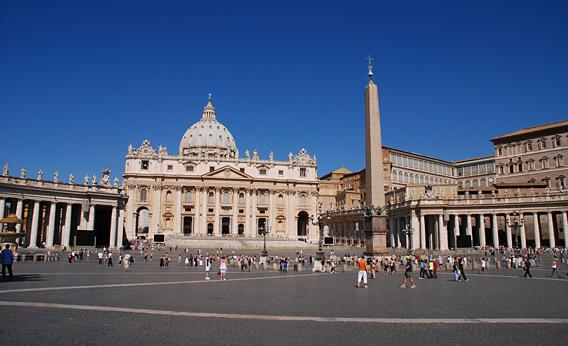“Infiltrating the Vatican: Inside the World’s Most Secret City,” by Tony Perrottet. In this five-part series, Perrottet ushers readers inside the Vatican Library, the Sistine Chapel, the Vatican supermarket, and the Vatican “Secret Archives,” as he describes the ubiquitous religious pageantry and the vast history of the city. A couple of highlights: A 700-page book on the crime of heresy and the dark tunnels under St. Peter’s Basilica.
“Ghost Ship: In 1872, the crew of the Mary Celeste disappeared without a trace. Her story only got weirder from there,” by Paul Collins. In 1872, the Mary Celeste was discovered crewless near Portugal. Thirteen years later, its new Captain was caught using the ship in a massive insurance fraud. Although the Captain wasn’t convicted, he—along with the rest of his crew—eventually went bust.
“Requiem for a Train: High-speed rail is dead in America. Should we mourn it?” by Will Oremus. House Republicans slashed the high speed rail budget last month, effectively killing America’s dreams of fast, comfortable train travel. The consequences: California will have to build more highways, leading to increased congestion and pollution. But at the same time, Oremus notes, the Obama administration’s weak stance on trains has saved political capital for health care reform.
“Is Newt Nuts? Consider the symptoms: Bouts of grandiosity, megalomania, irritability, impulsiveness, spending sprees …”by Jacob Weisberg. Judging by his public statements and private notes, Former House Speaker and current GOP presidential contender Newt Gingrich may be hypomanic, Weisberg says. What’s that, you ask? Read on to find out, and be sure to check out the accompanying slideshow of Newt’s doodles.
“It’s Missing Louisville, Fresno, and Parts of Thailand: But I still love my globe,” by Ken Jennings. Globes display geographic relationships better than any digital tool, argues Jennings. Alaska and Siberia, for example, are next to each other on the globe; on a map, the countries live at opposite ends. Despite our increasing reliance on GPS and Google Maps, read why Jennings has faith that the globe will survive.
“Adventures in Baby-Sitting: From Marilyn Monroe’s former mental patient to Jonah Hill’s bawdy caretaker, a brief cultural history of the American sitter,” by Ruth Graham. Seems like we’ve always had baby-sitters. In fact, the trend began post-Depression but didn’t take off until after World War II, Graham reveals. Since then, books, movies and magazines have portrayed the American sitter as patriotic, delusional, and seductive. Graham predicts the Great Recession will revive the job: It could even become a co-ed endeavor.
“Best Books of 2011: Slate writers and editors pick their favorites,” by Slate Staff. Slate staffers picked a wide-range of non-fiction and fiction for its annual great reads round-up. Fiction choices include David Foster Wallace’s The Pale King and newcomer Teju Cole’s Open City. Non-fiction ranges from stories of the college admissions process (Andrew Ferguson’s Crazy U) to an examination of subway sign fonts (Paul Shaw’s Helvetica and the New York City Subway System).
“Can the Cans: Why food drives are a terrible idea,” by Matthew Yglesias. Want to do your part this holiday season? Save your $2, and don’t donate that can of organic chicken noodle soup to your local pantry. Charities can already get canned goods for dirt cheap. And the piles of canned food from your kitchen create extra sorting and storing work for local charities. The best alternative, Yglesias says, is to write a check instead.
“Does Inequality Matter? How ‘expenditure cascades’ are squeezing the American middle class,” by Robert H. Frank. As the rich spend more on luxury homes, private jets, and designer brands, everyone feels worse off if they can’t afford these things, Frank argues. In the end, even though the average American is better off than most of the world, we’re left simply feeling poorer than our ‘one percent’ neighbors.
“Are the Muppets Communists?” by Jeremy Stahl. Fox Business Network recently accused the Muppets of touting a communist message in their recently released movie. The Twitterati responded with questions to ask during the #GOPMuppetHearings. Stahl curates some of the best tweets: @owillis: “Let me phrase it in a way you can understand: Elmo love redistribute income?” #GOPMuppetHearings.
